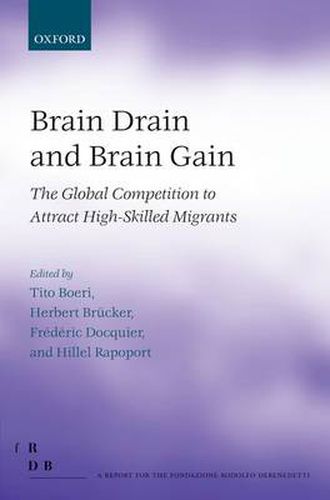Readings Newsletter
Become a Readings Member to make your shopping experience even easier.
Sign in or sign up for free!
You’re not far away from qualifying for FREE standard shipping within Australia
You’ve qualified for FREE standard shipping within Australia
The cart is loading…






The worldwide race to attract talents is getting tougher. The US has been leading the race, with its ability to attract PhD candidates and graduates not only from emerging countries, but also from the European Union. However, a growing number of countries have adopted immigration policies specifically aimed at selecting and attracting skilled workers. This book describes the global competition to attract talents. It focuses in particular on two phenomena: the brain gain and brain drain associated with high-skilled migration. Part I provides an overview of immigration policies designed to draw in skilled workers. It describes the economic gains associated with skilled immigration in the destination countries and the main determinants of the inflows of skilled immigrants (such as wage premia on education and R&D spending). It also discusses why skill-selective immigration policies do not find more support in receiving countries and shows that interest groups are actively engaged in affecting policies towards skilled migrants. Part II examines the consequences of brain drain for the sending countries. It reviews the channels through which skilled emigration can affect the source countries and looks at remittances, return migration, diaspora externalities, and network effects that may compensate the sending countries for their loss of human capital. Contrary to traditional wisdom, the results indicate that most developing countries experience a net gain from skilled emigration.
$9.00 standard shipping within Australia
FREE standard shipping within Australia for orders over $100.00
Express & International shipping calculated at checkout
The worldwide race to attract talents is getting tougher. The US has been leading the race, with its ability to attract PhD candidates and graduates not only from emerging countries, but also from the European Union. However, a growing number of countries have adopted immigration policies specifically aimed at selecting and attracting skilled workers. This book describes the global competition to attract talents. It focuses in particular on two phenomena: the brain gain and brain drain associated with high-skilled migration. Part I provides an overview of immigration policies designed to draw in skilled workers. It describes the economic gains associated with skilled immigration in the destination countries and the main determinants of the inflows of skilled immigrants (such as wage premia on education and R&D spending). It also discusses why skill-selective immigration policies do not find more support in receiving countries and shows that interest groups are actively engaged in affecting policies towards skilled migrants. Part II examines the consequences of brain drain for the sending countries. It reviews the channels through which skilled emigration can affect the source countries and looks at remittances, return migration, diaspora externalities, and network effects that may compensate the sending countries for their loss of human capital. Contrary to traditional wisdom, the results indicate that most developing countries experience a net gain from skilled emigration.